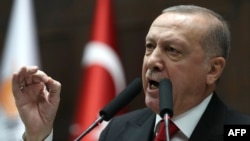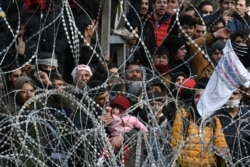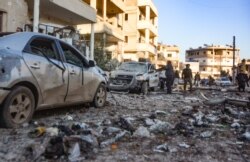Turkish President Recep Tayyip Erdogan said Monday he hopes to reach a cease-fire deal for Syria's Idlib province during talks this week with Russian President Vladimir Putin.
The two leaders are due to meet Thursday in Moscow.
Turkey and Russia back competing sides in the Syrian conflict, which has increasingly turned violent in Idlib and sent one million people fleeing the area.
Erdogan told a gathering of his ruling party in Ankara on Monday that a cease-fire deal with Russia could "prevent further bloodshed."
Putin spokesman Dmitry Peskov told reporters Monday that Russia and Turkey are keeping lines of communication open as they focus on negotiations.
On Sunday, Turkey's Defense Ministry said though it is "successfully" continuing its military operation in northwestern Syria against the Russian-backed Syrian forces, the Turkish government has no "desire or intention to clash with Russia."
Migrant death
In another development, a Syrian boy died Monday when a boat capsized off the Greek island of Lesbos, the first reported death since Turkey opened its border last week to let migrants into Europe.
More than 10,000 migrants have reached Turkey's land borders with EU countries Greece and Bulgaria since Erdogan announced he was opening Turkey’s border. The Turkish president made the move after Turkey lost 33 soldiers in a single airstrike last week in Syria. He said Europe must share the burden of Syrian refugees.
Erdogan warned Monday that "millions" of migrants will soon head for Europe. His comment drew criticism from European leaders.
German Chancellor Angela Merkel called Turkey's move "unacceptable," and said Ankara should not take out its dissatisfaction with the EU "on the backs of refugees." EU migration commissioner Margaritis Schinas said, "No one can blackmail or intimidate the EU."
War crimes?
Meanwhile, U.N. investigators issued their latest report on the Syrian war Monday saying both Russia and Turkey may be liable for war crimes for their actions.
The U.N. Commission of Inquiry on Syria said Russian forces carried out deadly airstrikes on a busy market in Ma'arrat al-Nu'man in July and on a civilian compound in southern Idlib in August.
It also cited detentions, killings and beating of predominantly Kurdish residents in the area of the northern Syrian city of Afrin, and assigned blame to Turkey-backed Syrian National Army rebels.







